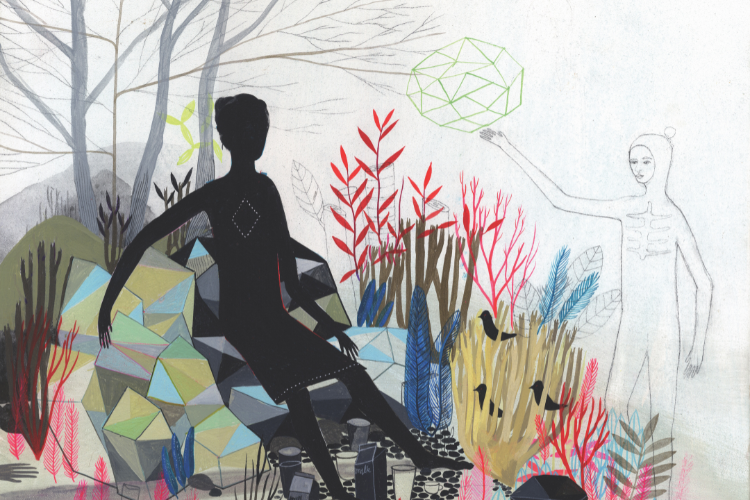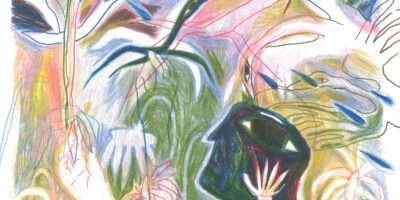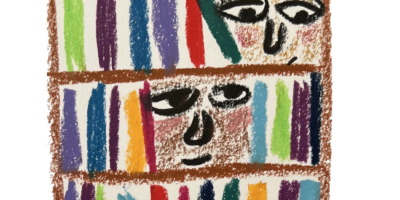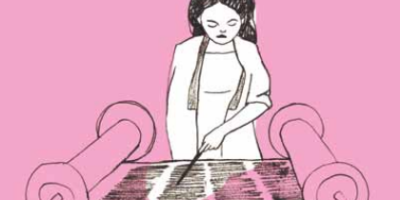
ART: BETSEY WALTON, “ASH.” MORNINGCRAFT.COM
Emails from Beyond
THE HATRED
Something else happened that was both fascinating and disturbing: I became a hater. I was shocked at how quickly and thoroughly I could hate people. I usually think of myself as having a patient, conciliatory disposition. Maybe I flatter myself; people are notoriously crap at self-assessment. But now, I fucking hated people with an intensity I’d previously reserved for head lice, sadistic teachers and rapists. There seemed no end to the list of people I suddenly could not stand. Various relatives, a handsy friend of my brother’s, assorted clergy, clingers, creeps and climbers, one of my mom’s doctors, the poor lonely guy in the bed next to her who sounded like any minute he might cough up a piece of his evangelizing Jesus-loving heart.
Cancer can bring out people’s loving, big-hearted, lasagna giving ways—but it can also bring out weird, pseudo-spiritual, insensitive impulses. In particular, an appalling number of people seem to subscribe to this asinine notion that dying is a kind of weak-willed act that one can refuse to engage in, that positive thinking and encouraging words can lick stage-four cancer. The unspoken corollary being that those who die do so not because it is universally inevitable, but rather for want of resolve.
Dear patient reader, let me interrupt this story with a public service announcement: should you find yourself at any time in the company of a dying person, please refrain from telling them to be strong, hang on, not give in. Refrain from using metaphors involving shedding skins or cleansing. If you have entry-level Buddhism to share, don’t. If you believe cancer to be the corporeal manifestation of negative thought patterns or psychic trauma, kindly keep this, as well as any other esoteric dumbfuckery you might espouse, to yourself. Thank you.
Self-anointed shamans talked to me about the “journey” that my mother was on. They brought books and crystals and flakey mystical terminology. The New Age music brought to mind hell’s waiting room. The number of truly unimportant people who suddenly felt that their presence was required at my mother’s bedside astonished me. I wished they’d all shove it up their chakras and leave. People sent information about the amazing curative powers of celery juice enemas, Tahitian noni extract, Manuka honey, organic kombucha tea, and human breast milk. They clipped infomercial-style articles about clinics in the Caribbean where one could undergo a total detoxification, get personalized cancer vaccines, have one’s heavy metals chelated, one’s demons exorcized and one’s aura cleansed.
Other folks simply sent cards, lip balm, plants or lasagna. Some sat quietly, others watched hockey with us in the ICU waiting room. Some people always had change for a coke from the vending machine. If they cried, they did so on their own time and did not require us to comfort them. Those people have my undying gratitude.

CODE STATUS
She had her sixtieth birthday there. Daniel and I spent a small fortune on a dark chocolate mousse cake that no one could eat. She got worse and worse. About ten days before she died, she finally confided to me that she knew she wasn’t going to make it. I burst into tears of relief. Oh my god. She’d said it. She made me promise not to let them intubate her and held my hand and said how very much she loved me. Then she told me not to be so angry and cynical all the time.
Am I angry and cynical all the time? I am not angry and cynical all the time. I wondered at that moment if she was seeing me as I was then: mother of a toddler, newly graduated doctor (“Mom! I’m the Most Responsible Physician now! Did you ever think I’d be the most responsible anything?” To which she’d replied, “Of course I did, you’re the most trustworthy person I know, what kind of question is that?”), partner in—yes—a lesbian relationship, maker of homemade bread and breadwinner, amateur potter, wearer of jeans and T-shirts. Her daughter. Or was I forever frozen in her mind as a sullen
and sarcastic fifteen-year-old, with a wide gulf of unspoken pain between us?
I knew that she felt she’d failed me. She’d said as much. And I mean, yikes, she sort of had failed me in some ways and I’m not exactly all kumbaya and sunshine. Still, there is so much to raising a child. I was now standing in awe of that work, and the ways she’d come through for me, too. I’d said before that we were good now, that I was okay. I hugged her as though to assure her of all that again, because now she was drifting off and I didn’t think she’d take in so many words.
KUBLER-ROSS
After the shiva, I spent a month on the couch rereading all the Dykes to Watch Out For comic books and rewatching Six Feet Under right from season one, episode one. Kagiso was generous in requiring me to do nothing at all: I didn’t have to talk, I didn’t have to smile, I didn’t have to take out the trash.
I had a big white spot on my right index fingernail. I had tried to clean my mom’s mouth when she was unconscious one day and she bit me so hard and so long that I wondered if she’d ever let go. The pain was incredible. I didn’t tell anyone about it. I thought that if she had been conscious, she’d have been embarrassed.
I looked at the spot every day now dreading that my nail was growing and that I’d soon lose this little reminder of her. I worried that she’d slip from my memory and I’d forget her voice or her face. With each day the world would be increasingly different from the one she’d lived in and all of us would change from the people she had known. I would be unrecognizable to her and she wouldn’t know me anymore.
I sent her daily emails hoping that she had access from her new dimension:
Hi Mom, here are little newsy updates about my life, stuff Motsumi has done today, things I’m thinking about phrased in a way that I think you’ll find funny. Love you, Jen.
Hi Mom, what the fuck was up with pretending like you weren’t dying when you manifestly were, if you get a chance to do it over, don’t do it like that again, okay? Love you, Jen. PS. I’m not cynical.
Hi Mom. I’m sorry. That was mean. Dying must be really painful and scary and I know you were worried about Benjamin and Grandma and Grandpa. I just wish we could’ve talked about it more. Okay, fine, you’re right. I’m angry. I hope you’re happy. No, I genuinely do! That wasn’t sarcastic. Love you, Jen.
I checked my inbox every day to see if she’d written back. I imagined the next world as some kind of national park with lovely scenery but sporadic internet access.
Grieving is a funny thing. There are stages of it, which I was reading about in a book someone lent me. I counted them like plagues at Passover. The book said it wasn’t linear. Uh-huh. Great.
The idea was to Be In The Present with one’s Grief, not to hurry it along. This was unbearable to me. If The Comfort Place was Canaan in the distance, I intended to march through that desert, not spend forty years walking 500 clicks like some other chumps I could name. Does history teach us nothing?
Let’s see: I’d done Anger like nobody’s business. We embarked on Denial together as a family project and, if I do say so myself, we really rocked it. Depression: done and done, a really thorough job, need I say more? No longer having to watch her endure that hellish semi-existence helped a lot with Acceptance.
The email, I realized, was Bargaining:
Fine, go and be dead if you have to. See if I care. (I am not angry and cynical.) But could you at least send me an email? Is that really so much to ask?
Haven’t I always called you to say I’ve arrived safely?
Jennifer Douek is a family doctor, parent and now a writer too, in Ottawa, Canada.






